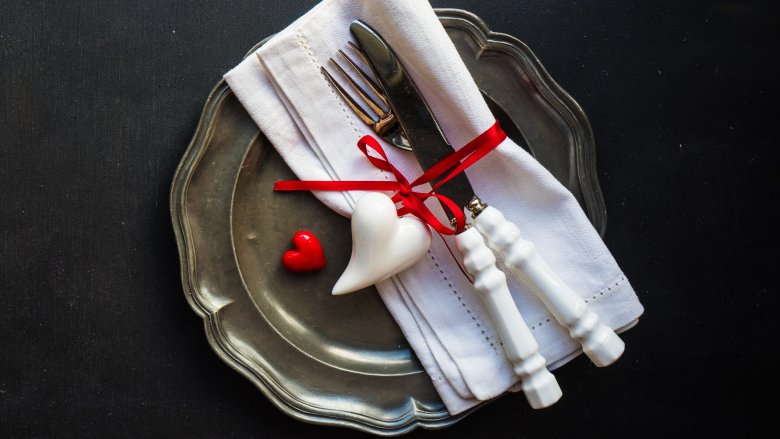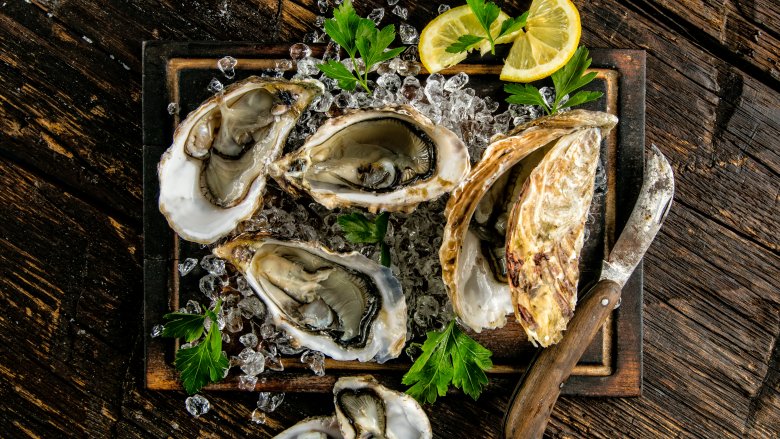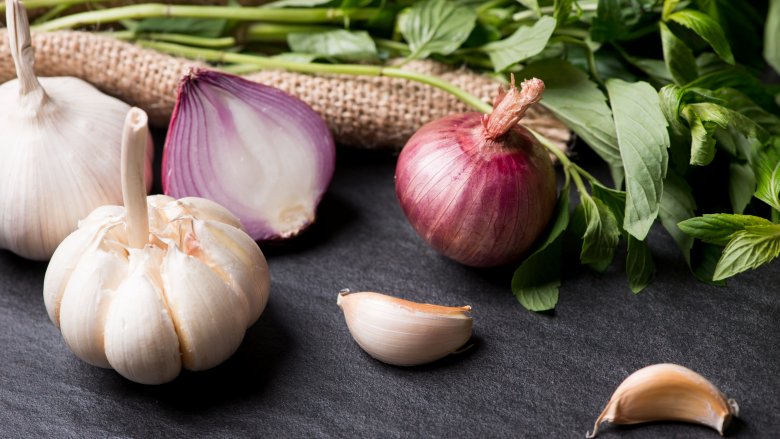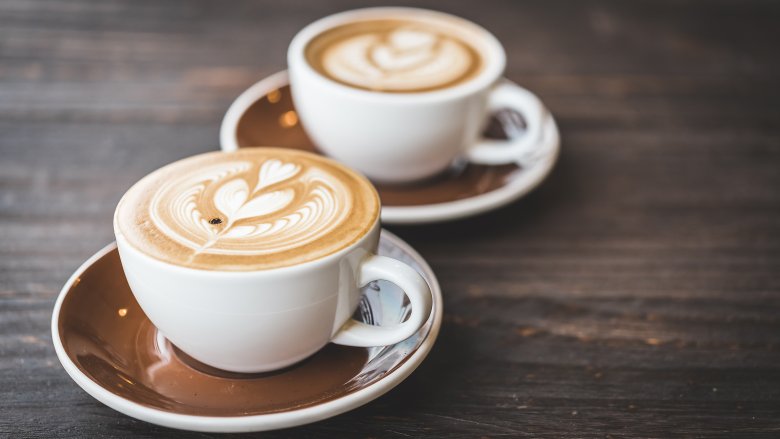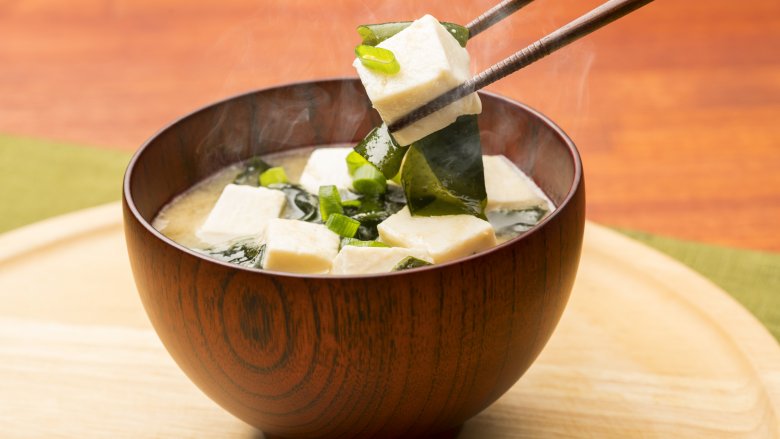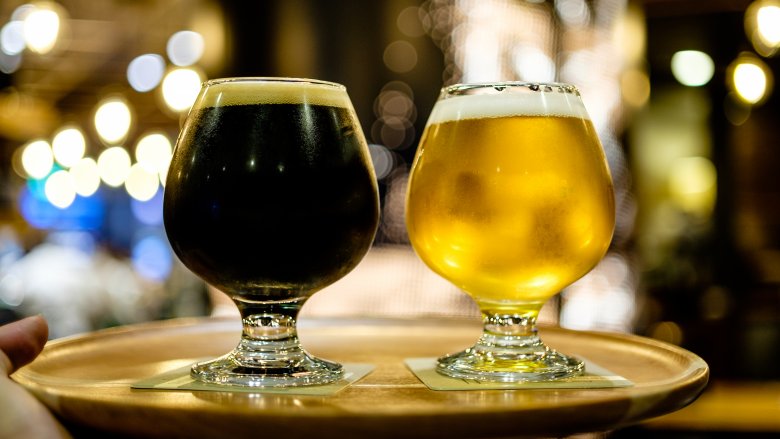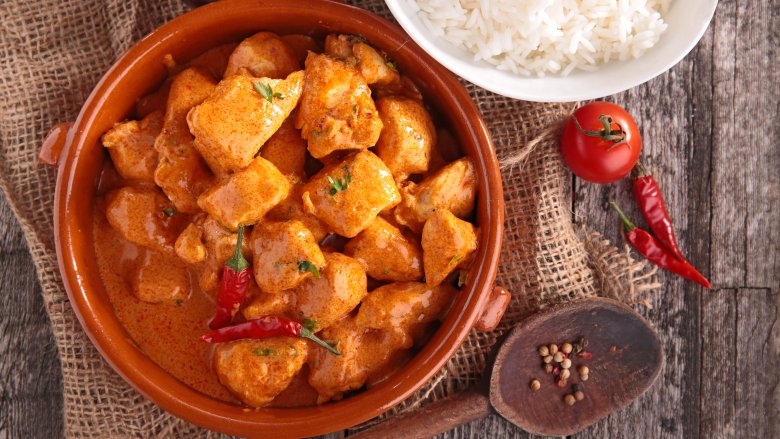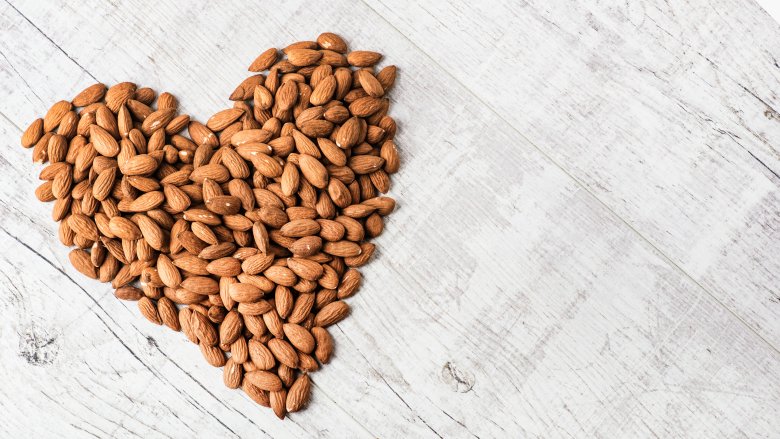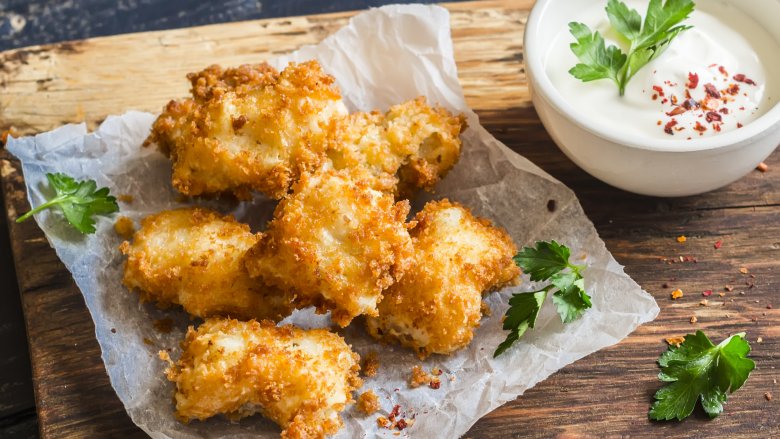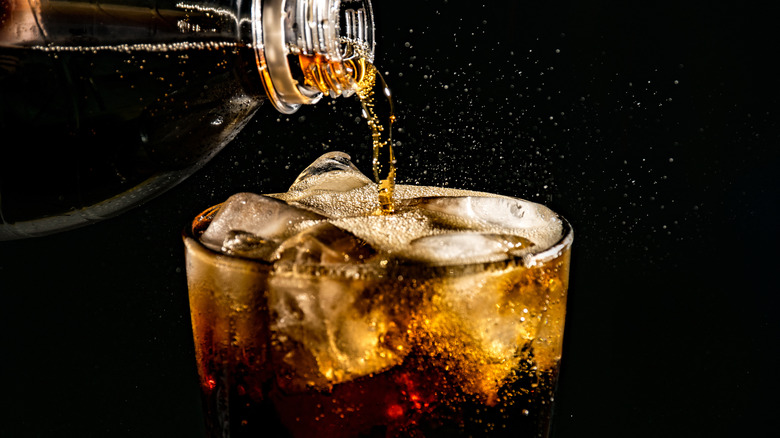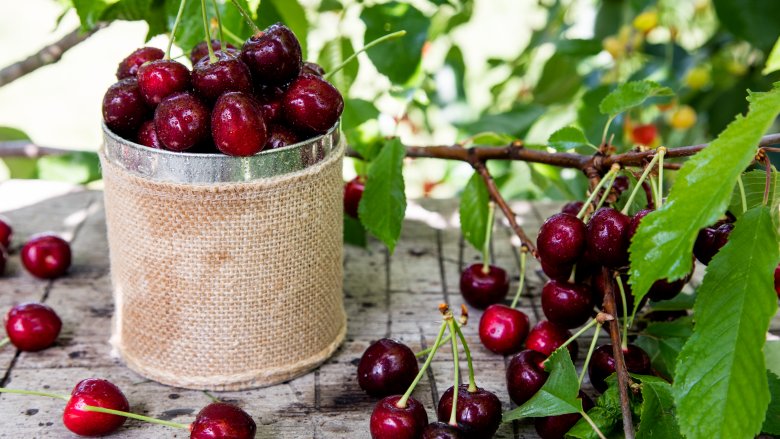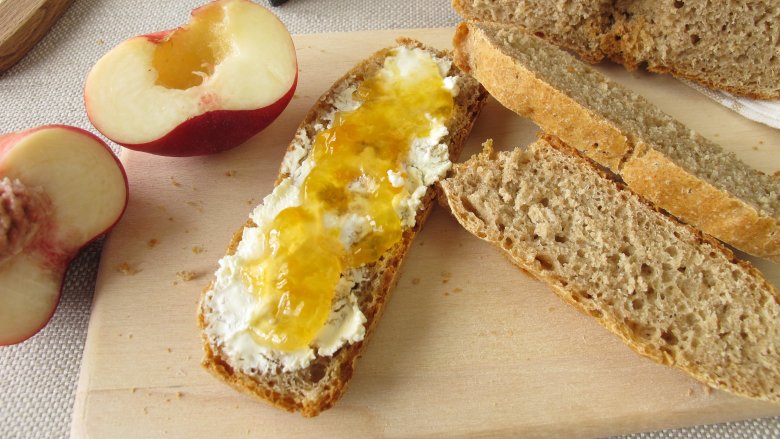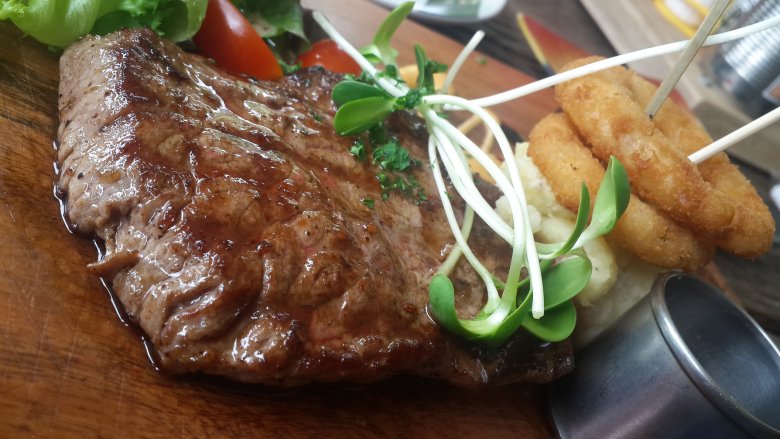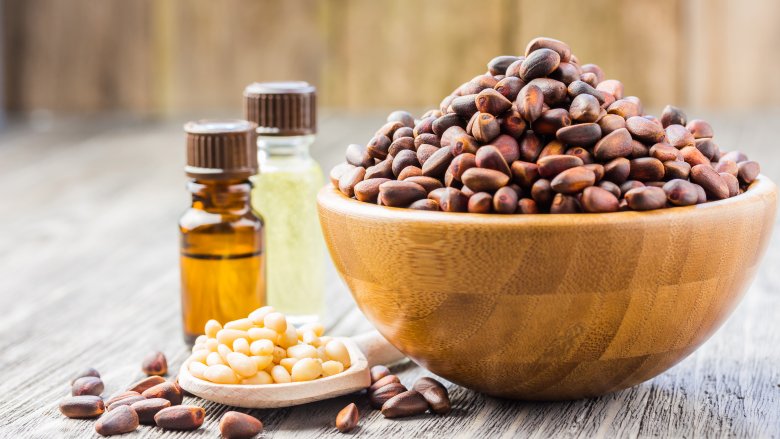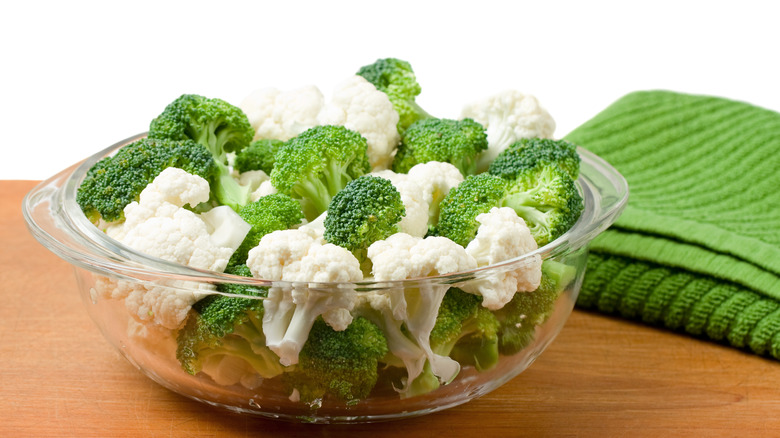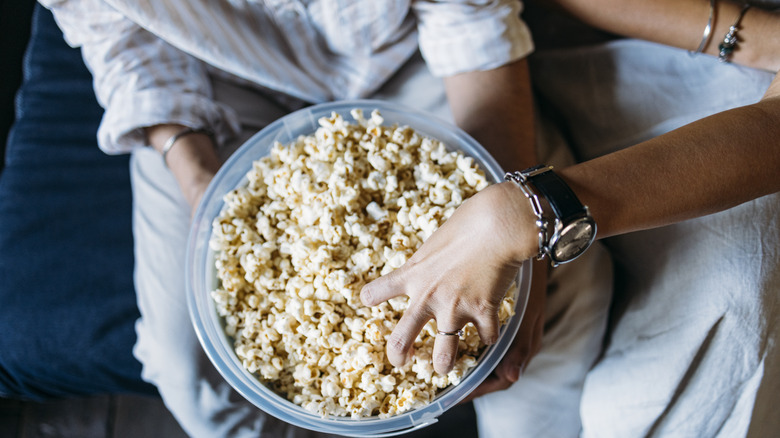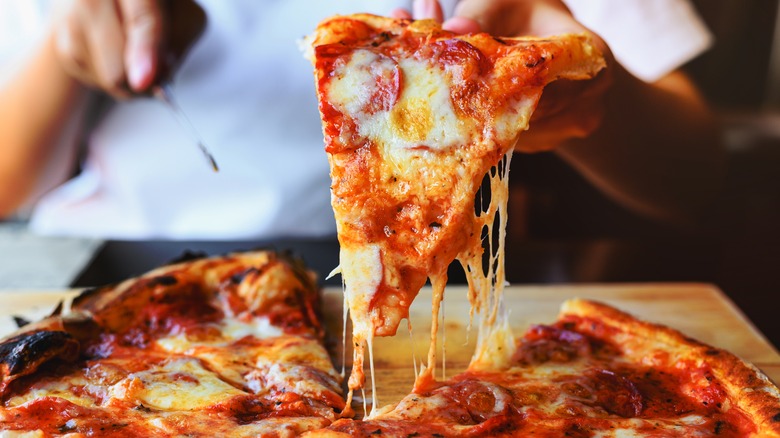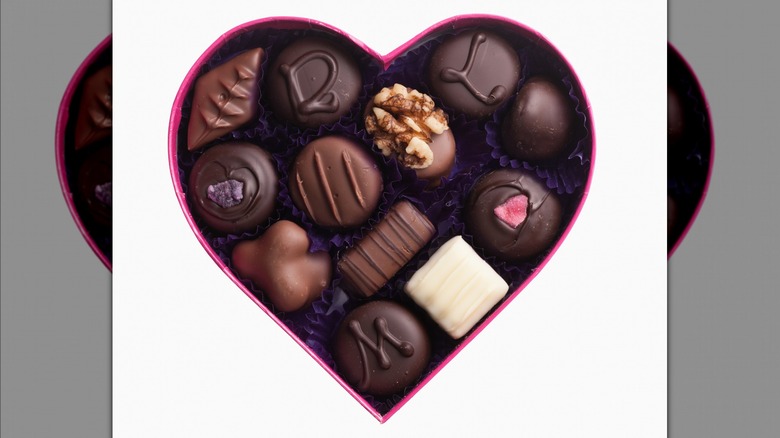Foods You Shouldn't Eat On Valentine's Day
Whether you're enjoying the thrills and excitement of a new relationship or the comfort of a long-term one, Valentine's Day can be something special. It's a great excuse to fit a romantic meal into an inevitably busy schedule, and it doesn't matter if you're going out or staying in, the important part is who you're sharing that dinner with. That... and what happens after. So, while you might be tempted to prepare — or order — something that's as extraordinary as the evening you've got planned, be warned that you might pay for it later. Let's talk about some foods that can ruin your night, so you know just what you should stay away from.
Oysters
The idea that oysters are an aphrodisiac is an old one, and the Smithsonian says the belief dates back to the Roman Empire. Casanova supposedly feasted on oysters on the reg when he was seducing hundreds of women, but you might want to not follow in his footsteps.
Not only is actual evidence of oysters' supposed hormone-enhancing properties pretty scarce, but the Centers for Disease Control and Prevention say oysters are one of major sources of foodborne illness. Raw — or even improperly cooked — oysters are linked to about 80,000 cases of illness a year, and kill around 100 people. Not much will ruin your romantic meal like a bout of vibriosis, which typically involves some serious gastrointestinal distress. So skip the oysters, and just put some jazz music on instead.
Onions and garlic
No one in the history of the world has ever been turned on by onion breath, but that's not what we're talking about here... not entirely, at least. While you might be able to fix bad breath with help from your toothbrush and some mints, onions and garlic also have the potential to cause something not as easy to fix — some major gastrointestinal distress. That's even less attractive than bad breath, and it's entirely possible you haven't realized these popular ingredients are the problem.
Eleanor Cummins explored her onion and garlic intolerance in a Popular Science piece, and says her long-standing digestive issues were finally traced — in part — to garlic and onion. More specifically, she was reacting to plants from the allium family, and says most of the professionals she talked to weren't even aware her intolerance was a possibility. (Also, it's worth adding it's officially an intolerance instead of an allergy because it's just inconvenient, not life-threatening.) If your stomach sounds like a poster child for Pepto Bismol after downing a garlic-heavy dish, well, now you know.
That after-dinner coffee
While you might be tempted to linger at the table a little while longer and indulge in an after-dinner cappuccino, you might want to rethink that — especially if you're not used to drinking coffee by the gallon.
Manhattan Gastroenterology says there are a few things that have the potential to go wrong here, and they can all ruin a night. Sometimes, coffee can irritate the lining of your digestive system and cause serious pain, and it can also have a laxative effect. Less well known is coffee's potential to irritate the prostate and the bladder — none of which are conducive to a romantic evening. And if you think you might be able to dodge those effects by switching to decaf, it's possible that will make your problems even worse. An after-dinner drink is fine, just give the espresso a pass.
Soup
Soup is usually a pretty safe option, but you might want to think about skipping a soup appetizer if you're out for a romantic meal. Commercially-produced soup is one of the biggest offenders when it comes to hidden sodium, and while you probably know too much sodium isn't good for your heart, you should also know it's not good for your waistline, either. If your meal is too high in sodium, your body will have to deal with all the extra salt. SF Gate's Healthy Eating says it does that by retaining water to help dilute the sodium, and that leads to some seriously uncomfortable bloating.
If you do end up suffering from some sodium bloat, they also have an unlikely remedy: drink more water. You might feel like your insides are swimming already, but more water — and a few trips to the bathroom — will help relieve some of the worst of the symptoms.
Too much alcohol
By all means, crack open that special bottle of wine or pull out those craft beers you've been waiting to try. But don't go overboard on the alcohol — and not even because no one enjoys hanging out with a sloppy, soused date. We're also talking about the stink factor.
Drug & Alcohol Rehab Asia (DARA) talks a bit about how too much alcohol can change our body's smell. They say alcohol breath comes not just from quantity, but from mixing different types of alcoholic drinks in a single evening. Aromatic liqueurs (especially coffee liqueurs) will also leave their signature smell on your breath, and it's entirely possible your sweat will start to smell like booze if you drink too much over the course of the evening. Beer is the biggest offender, but all alcohol is at least partially processed and excreted through sweat. Plus, no one is turned on by beery burps, either.
A spicy curry
Skip the curry for your Valentine's Day dinner, and your date will appreciate it. Even if you have a breath mint, some gum, or a toothbrush, you might not be able to mask the odors that come along with super-spicy curries.
That's because it's not just on your breath. According to Mt. Sinai School of Medicine dermatology professor Debra Jaliman, MD (via Prevention), curries and other similar dishes go through a bit of a change when they hit the digestive system. They're broken down into gases that contain sulfur, and some of that leaves through your sweat. It's likely you'll be carrying around the lingering odor of curry for at least a few hours after dinner, so you might want to pick something a little less powerful.
Almonds
It doesn't matter what you have planned for after dinner, it's safe to say you want to be awake to enjoy it, right? You might want to consider cutting almonds out of your Valentine's Day dessert, because they're pretty much nature's sleep aid.
Sleep expert Sammy Margo (via Independent) even recommends snacking on a handful of almonds if you're heading off to dreamland. They're not only packed full of healthy fat, but they're also high in magnesium and tryptophan, which all work to slow nerve function, muscle function, and steady your heart rate in preparation for a good, long snooze. That's great — on any other night!
Fried foods
If you're tempted to make your romantic meal a decadent diet cheat night, you might want to refrain from adding your favorite fried foods to the menu. There are a few things at work here, so let's start with the grease. According to Manhattan Gastroenterology, greasy foods top the list of worst things you can eat for a happy digestive system. It's extremely difficult for the human body to process, and your system will probably let you know it with some acid reflux and heartburn.
The Harvard Medical School says things are no better when they reach the other end, and if your plans include a night in the bathroom, fried foods are the way to go. Because grease is so hard to digest, chances are good some of those fatty acids are going to end up right in your colon. That has the potential to cause diarrhea of the sort you see in a certain kind of comedy movie, and since you probably wouldn't choose to watch it for your Valentine's Day flick, make sure you're not living it.
Carbonated beverages, seltzer water, and mixers
Even if you've been with your other half forever, you still want to make a good impression during your special romantic meal. Do you know what doesn't make a good impression? Gas. Regardless of which end it's coming out of gas is never a turn-on, so skip the carbonated drinks, fizzy mixers, and seltzer water.
There's another reason you should give them a miss, too, and it's not just because of those epic burps. According to Brigitte Zeitlin, MPH, RD, CDN (via SELF), those carbonated drinks can also cause you to feel uncomfortably bloated. Yep, even seltzer. You're drinking liquid with little pockets of air in it, after all, and even if you get rid of some of that with those burps we mentioned, you could still end up finding yourself awkwardly full. That effect can be made even worse by sweetened seltzers, because that sweetness comes from sugar alcohols we can have trouble processing. Bonus? This is one tip that you can take with you to make your everyday hydration efforts much less uncomfortable.
Cherries
Cherries are the finishing touch on many romantic desserts, but if you've got big plans, you might want to avoid them for a weird reason. Cherries are surprisingly high in melatonin, and while that's an antioxidant that's good for you, it'll also help put you to sleep. According to Dr. Michael J. Breus (via Huffington Post), cherries are so full of this sleepy-time chemical that studies show cherries — and tart cherry juice — can be a legitimate, all-natural option for anyone suffering from insomnia. A study from Northumbria University also found Montmorency cherries not only helped put participants to sleep faster, but the extra melatonin made such a difference that it helped them get a better sleep, too.
That's great news on almost any other day of the year, but when it's time for a romantic evening, you want to be awake. Skip the cherries now, and save them for when you need some extra shut-eye.
High fructan grains
First, what are high fructan grains? Fructan is a carbohydrate found in grains like wheat and rye, and research has suggested they're actually what's behind the bloating and pain that's associated with non-celiac gluten sensitivity.
Vox talked to Dr. Umberto Volta from Italy's University of Bologna, and found there's increasing evidence that people who feel funky after eating some grains and pastas aren't reacting to gluten at all, but to fructan — so you may want to avoid foods high in fructan if gastrointestinal discomfort isn't part of your Valentine's Day plans. Pass on the rye and wheat bread and crackers, as well as things like beetroot, apples, peaches, mango, watermelon, and cashews.
Pro-inflammatory foods
You're probably familiar with the idea that some foods can help your body fight inflammation. According to the Harvard Medical School, inflammation has been linked to things from arthritis to depression, and anti-inflammatory foods like strawberries and fatty fish can help manage these chronic conditions.
There's a flip side to that, though, and that's pro-inflammatory foods. These foods can make any chronic conditions you have worse, and there's nothing that ruins a romantic meal like a flare-up of something you're trying to manage. They say to stay away from refined carbs (like white pasta and bread), fried foods, soda, margarine, and red meat to help make sure chronic conditions stay under control.
Pine nuts
Pine nuts are delicious, and they're the finishing touch on any number of dishes you might be tempted to serve up for an extra-special meal. You might want to rethink that, based on a relatively rare but super-weird thing called pine nut syndrome.
Robin Abcarian wrote a piece for the Los Angeles Times after developing the condition and doing some research. It's a weird thing that can't be explained and can happen to absolutely anyone, even people who have eaten pine nuts before. It only takes a few to trigger, it's not connected to preparation methods, sources, or contaminants, and it's not an allergy. After eating pine nuts, a person has the chance of developing a weird, metallic taste in the mouth that can last anywhere from a few days to a few weeks. The FDA says the more you food eat, the worse the taste gets... and that's going to put a damper on your evening! So, be on the safe side and skip the pine nuts.
Broccoli, cauliflower, and other cruciferous vegetables
Cruciferous vegetables — including veggies like broccoli, cauliflower, cabbage, Brussels sprouts, and kale, to name a few — come with a slew of health benefits. They are rich in antioxidants and vital nutrients such as beta-carotene, calcium, and potassium, and help contribute to overall gut health. But one side effect that often comes with consuming these nutritious vegetables that is decidedly less glamorous? Gas.
It's true — the cruciferous vegetables that often come seasoned and roasted on the sides of our fancy Valentine's Day meals can also cause bloating and gas. This is because, although they are high in the good, nutritious stuff, they are also high in sulfur. As sulfur breaks down in our bodies, it can cause some less-than-romantic symptoms such as abdominal pain, gas bubbles, bloating, and foul-smelling flatulence. Yikes. Talk about a potential mood killer. You may want to stick to some lower-sulfur veggies, like spinach, celery, corn, or bell peppers, when ordering your meal on the February holiday.
Popcorn
Snuggling up for a cozy movie with your other half might sound like the perfect, low-key date — but when it comes to the question of whether or not to pop a massive bowl of buttery, salty popcorn to share with your beloved, we'd encourage you to veer on the side of "not." This is because popcorn is notorious for causing issues for our teeth.
The problem is in the kernels, which are known for wreaking havoc on our poor mouths. Shards from popped pieces (called popcorn hulls) can become caught in our gums, causing embarrassment when we smile or pain as we try to dig them out. The kernels that remain unpopped at the bottom of the bowl, however, are what harbor the real danger. Unintentionally biting down on a hard, unpopped kernel can cause a cracked tooth — something that often requires an emergency dental visit. Since most dentists will likely be enjoying their own dates with their sweethearts, a cracked molar on Valentine's Day movie night might just have to wait until the following morning to be fixed.
Pizza
We know, we know, pizza is the ultimate in-home date night food. But hear us out: The popular saucy, cheesy dish originating in Italy has a seriously high grease content. Food Network reports that in a 324-calorie slice of pizza, 117 of that comes from the bubbling grease pooled on top. Gross.
Foods high in grease can have an immediate negative effect on our digestive systems. Because grease is so high in fat, it causes our stomachs to empty more slowly, leading to bloating, pain, and sometimes a feeling of nausea. Some may even suffer the onset of diarrhea thanks to the slew of copious lard — an especially unfortunate symptom to experience on Valentine's Day evening, to be sure. In addition, frozen pizza has been linked to cases of foodborne illnesses, such as E. coli, in the past. While a slice of deep dish is so delicious that it could be considered an aphrodisiac for some, a case of food poisoning or a painful belly full of grease is decidedly not. You'll have to decide if that pepperoni pie is worth the potential risk to your perfect Valentine's Day evening.
Too much chocolate
Though a case for avoiding chocolate might seem strange on potentially the most chocolate-forward holiday of the year, there are two relevant reasons you might want to set down the box of cocoa hearts before demolishing the entire thing in one sitting. First, you have probably read that some dark chocolates contain cadmium and lead, such as 85% and 72% dark chocolate from Trader Joe's. But what's the other reason, you ask? Tiredness.
We're serious. Eating too much chocolate can cause drowsiness in people, and there are multiple reasons for this. One is a sugar crash, a very real phenomenon in which blood sugar levels spike very quickly and cause the body to produce insulin in response. Then, to compensate, the body drops the blood glucose levels rapidly, causing tiredness, fatigue ... and, likely, a lack of energy for romantic Valentine's Day endeavors. In addition, the treat contains elevated levels of magnesium, a mineral that many suffering from insomnia take to promote smoother, better sleep. This is especially true of dark chocolate, which contains the highest levels of magnesium — so if you have late-night plans, you may want to consider this effect before reaching for yet another handful of the dark chocolate-covered almonds from your sweetheart.
